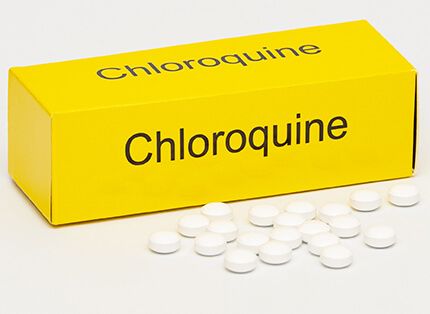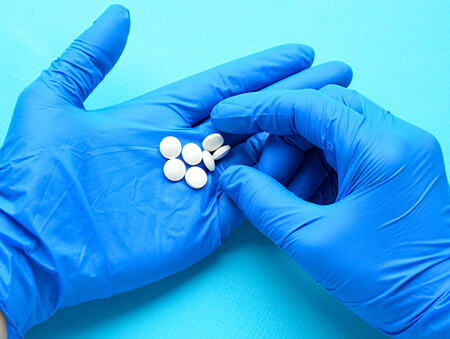Generic Chloroquine: Price, Side Effects, Precautions
Generic Aralen, also known as chloroquine, is a medication used to treat and prevent malaria. With a low cost and decent efficacy rating, it remains one of the top-selling drugs to buy online. Generic medications tend to be cheaper than their brand name equivalents. This just is one of the reasons generic Aralen is an attractive option for those seeking malaria medication on a budget. If you're looking to buy Aralen, or seeking to get any other generic medications for sale, look no further than Canadian Pharmacy Online.
What Is Chloroquine?
Chloroquine is a drug with anti—inflammatory, immunosuppressive, antiarrhythmic, antimalarial and antiprotozoal effects.
Chloroquine was first synthesized in 1937 and was initially used to treat malaria as a more affordable alternative to quinine. Over time, other medicinal properties of this remedy were discovered, which made it possible to significantly expand the scope of therapeutic use of chloroquine.

At the moment, many pharmaceutical companies produce a generic Chloroquine, which is absolutely identical to the «original» chloroquine in chemical composition and therapeutic effect.
Advantages of Chloroquine
- It contains the optimal therapeutic dosage of chloroquine — 250 mg.
- Chloroquine eliminates all the shortcomings that were identified during the clinical use of the first generations of chloroquine.
- A wide range of tablets in a package — for a therapy course of any duration.
Generic Aralen Price Information
People looking to buy generic Aralen for the treatment of certain diseases may be pleased to know that this drug is widely available for sale through several Canadian pharmacies, both online and in-store. Various local and national pharmacies carry generic Aralen at very competitive prices, making it an attractive option for those who need to buy it on a regular basis. Online stores are particularly popular as they often offer good deals on bulk purchases of this medication. That being said, customers should always take the time to compare prices between different vendors before finalizing their order and buy from a trusted source that provides quality services. Thanks to the wide availability of generic Aralen in Canadian Pharmacies, those who buy this medication can save money without sacrificing quality or safety.
Pharmacological Properties
What Chloroquine Is For
Generic Chloroquine is prescribed for the treatment of malaria and protozoal infections, as well as a number of autoimmune diseases accompanied by inflammatory processes and / or metabolic dysfunctions.
How It Works
The anti—inflammatory effect of chloroquine is based on the ability of this drug to influence a number of systemic metabolic processes involved in the formation of an inflammatory reaction, including those of allergic origin:
- reduces the activity of leukocytes and lymphocytes (including T-killers);
- stabilizes the state of cell membranes;
- normalizes the number of red blood cells
- suppresses autoallergic processes and prevents further division of sensitized cells.
In relation to malaria and protozoal infections, the action of Chloroquine consists in the active suppression of DNA synthesis by all species of Plasmodium and Entamoeba, which leads to their inevitable death.
Who Chloroquine Is For
Chloroquine is used in the treatment of the following diseases:
- All types of malaria.
- Extra-intestinal amoebiasis.
- Amoebic liver abscess.
- Rheumatoid arthritis.
- Systemic lupus erythematosus.
- Scleroderma.
- Cutaneous porphyria in the late stages.

Recommendations
Dosage
- Malaria. On day 1: first 1 g of the drug, after 6-8 hours — 500 mg. On the 2nd and 3rd days: 750 mg.
- Amoebiasis. First week: 500 mg 3 times a day. Second week: 250 mg 3 times a day. After the second week: 750 mg twice a week until full recovery.
- Rheumatoid arthritis. First week: 250 mg 2 times a day. After the first week and throughout the year: 250 mg daily.
- Lupus erythematosus: 250-500 mg daily.
The scheme of taking Chloroquine and the daily dosage may be changed by the attending physician, depending on the age and condition of the patient, as well as the type and nature of the disease.
Contraindications
- Severe forms of hepatic and/or renal insufficiency.
- Visual disturbances, especially retinopathy or keratopathy.
- Aplastic anemia.
- Myocarditis complicated by arrhythmia.
- Psoriatic arthritis.
- Neutropenia, secondary porphyrinuria.
- Pregnancy in any trimester.
Side Effects
With a probability of >2%, loss of appetite, nausea, vomiting, pain in the head or abdomen, muscle and / or joint pain, dermatitis, temporary photosensitization, dizziness, ringing in the ears, sleep disorders, seizures, hair loss, discoloration of the skin, confusion may occur.
Overdose
Exceeding the recommended dosages of Chloroquine or violation of the intake regimen can cause vomiting, headache, seizures, visual disturbances, impaired clarity of consciousness. In some cases, collapse and death may occur as a result of respiratory depression.
Treatment: urgently rinse the stomach (as an option — use an emetic), then give the patient activated charcoal in a dosage five times higher than the dose of Chloroquine. With severe intoxication, plasmapheresis or peritoneal dialysis is indicated.
Interaction with Other Drugs
It is strictly forbidden to take Chloroquine simultaneously with the following groups of drugs:
- Auranofin, Levamisole, Penicillamine, Phenylbutazone: due to increased neurotoxicity.
- Cytostatic drugs: Carboplatin, Cisplatin, Cyclophosphamide, etc.
- Antimalarial agents: Amodiaquine, Mefloquine, Primachine, etc.
Combining Chloroquine with the following drugs also requires caution:
- Antacids: Aldroxicon, Acid Gone, Maalox, Pepcid Complete, etc
- Cimetidine: may increase the content of chloroquine in blood plasma.
- Glucocorticoids: Beclomethasone, Dexamethasone, Prednisone, etc.
- Cardiac glycosides: Amrinone, Digoxin, Isadrin, etc.
- Monoamine oxidase inhibitors: Phenelzine, Deprenyl, Moclobemide, etc.
Antacid group drugs worsen the absorption of chloroquine. Glucocorticoids increase the risk of cardiomyopathy and myopathy.
Cardiac glycosides and monoamine oxidase inhibitors in combination with Chloroquine become significantly more toxic.
Instructions and Precautions
- Long-term use of Chloroquine requires constant monitoring of the condition of the retina and cornea of the eyes.
- In the last decade, there has been an increase in resistance in certain Plasmodium species to the action of chloroquine — in particular in Plasmodium falciparum.
FAQ

Can I take the drug during pregnancy?
Only for the prevention of malaria and only in a dosage individually selected by the attending physician.
Can I give it to children?
It is allowed to use the drug for the treatment of children aged 1 month and up to 15 years who are subject to individual correction of the dosage and regimen of the drug.
Is it safe for the elderly?
Chloroquine is not recommended for elderly patients with kidney problems or complications. Take caution and consult a health care professional before deciding on taking the course of the drug.
Is it true that Chloroquine is dangerous for the eyes?
With prolonged use, the drug can have a toxic effect on the cornea and retina of the eye, as a result of which the patients who take chloroquine should be regularly monitored by an ophthalmologist.

